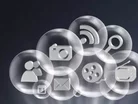Tips for Developing a Hospital mHealth Strategy

Hospitals the world over are talking about mHealth, and a mobile health strategy is becoming a concern for the c-suite similarly to supply chain management and patient care. It’s a big talking point and a topic that cannot be ignored. Hospital CIOs and healthcare IT administrators are looking for new ways to get their heads around mHealth; physicians and nurses are already using mobile devices such as smartphones and tablets in their professional day (at the moment, largely for reference purposes), however, many experts in hospital management believe that mHealth tools and applications can, and should, be used more widely to improve processes and patient care.
Healthcare Global takes a look at ways to implement mHealth within a hospital environment and offers best practice tips for developing a watertight mHealth strategy >>>
#1. Bring Your Own Device (BYOD)
BYOD strategies are becoming increasingly more popular across many industries, including healthcare. Many health institutions are allowing their employees to use personal devices in a working environment to access information and applications. BYOD strategies have many plus points, for example employees are familiar with their devices making them more efficient, however there are also risks involved when allowing employees to access company information from their own laptops, smartphones and tablets. When implementing BYOD guidelines, be sure to address safety and security online, for example make sure all secure data is password protected and be sure to have systems in place that allow for password changes should an employee leave the business.
#2. Utilizing Apps In A Hospital Environment
Healthcare executives have in the past shied away from using external applications through fear of diluting information. However, regulators such as Happtique have begun entering the market place providing healthcare executives and professionals with industry standards and benchmarks, thus the use of mobile applications is becoming more widespread and trusted. Hospitals can use apps in many ways, not just to improve patient care, but also to save costs by transferring operations such as billing, room scheduling, payroll and coding to an app format.
#3. Mobile Patient Management Tools
Mobile health has taken a front seat when it comes to delivering patient care. Telehealth robots have begun walking the corridors of hospitals signaling a move towards more and more telehealth applications and devices. Real-time video applications have facilitated this growth. Telehealth is going to continue to grow at a rapid pace, don’t be afraid to embrace it – just as with anything, make sure your staff are properly trained to avoid any hiccups.
#4. Mobile EHR
EHRs are big news in the healthcare arena at the moment, with many physicians and healthcare execs seeing the benefits of adopting the new technology. EHR is being adopted on a mass scale, however many physicians are yet to see its full potential because they are not using it on a mobile platform. Mobile EHR should be encouraged in a hospital environment; it leads to efficiencies, error reduction and cost savings. It is also important to note that proper training needs to be given to ensure patient care is not compromised during the transition.
#5. Secure Messaging
As part of Stage 2 of Meaningful Use, there needs to be secure messaging with patients. In addition, secure and HIPAA compliant messaging among providers and others in the hospital is warranted.
Hospitals present unique workplace issues and deserve special considerations regarding mobile technologies. IT personnel need to develop mobile strategies today to benefit the healthcare provision of tomorrow.
Read Related Content From Healthcare Global
